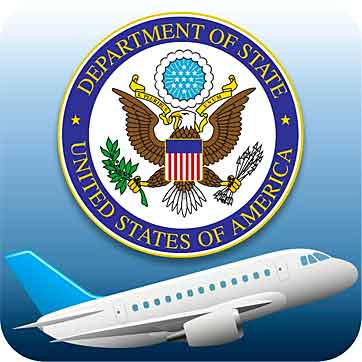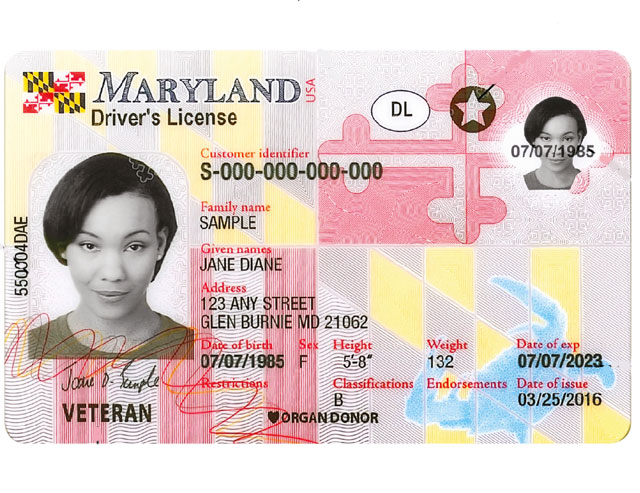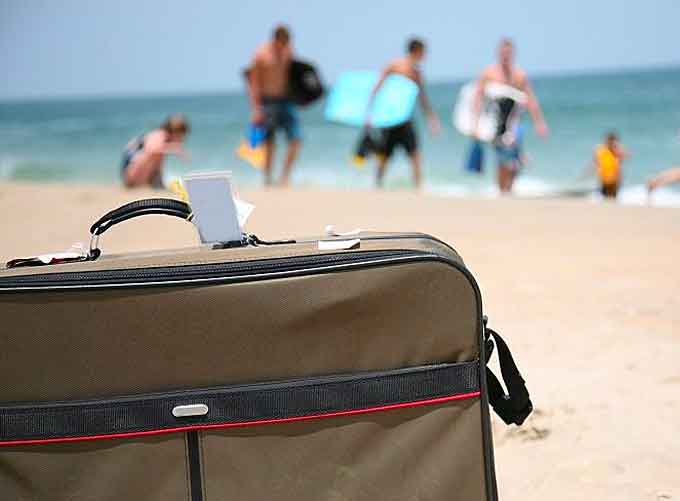
By the TSA
Ahhh, depending on what part of the country you’re in, there’s still a lot of cold weather to come, but spring break is in the air!
Below are tips and links to information on some of the most common travel-related questions as well as insider information on security updates and new web/app features.
It’s best to be prepared before arriving at the checkpoint. It makes things far less stressful to arrive early and prepared.
Please Note: The U.S. Department of State has updated Travel Advisories to Mexico: If you plan to visit Mexico, please read here, or for the latest updates go to the DOS website here.
To View U.S. Department of State Travel Advisories for All International Destinations, click here.
What’s New at the TSA?
Electronics and Carry-on Items:
As you may know, we’ve been rolling out enhanced screening procedures for carry-on baggage since last summer that require travelers to place all personal electronics larger than a cell phone in bins for X-ray screening in standard lanes.

- Examples of personal electronic items that should be removed from carry-on bags include laptops, tablets, e-readers and cameras.
- These procedures are now in place at almost all federalized U.S. airports.
- In addition to these procedures, TSA officers may provide additional instruction to remove items from your bag such as foods, powders, and any materials that can clutter bags and obstruct clear images on the X-ray machine.
- If your bag needs to be opened and inspected by TSA officer and you have privacy concerns, you can request private screening.
TSA Pre✓® Hours of Operation:
Individuals enrolled in TSA Pre✓® can also better plan their trip with the TSA Pre✓® checkpoint schedule tool, now updated with all TSA Pre✓® airports and lanes.
Simply, enter your airport, day of the week and time of day.
New on the My TSA App:
You can now check how busy the airport typically is on your specific day and time of travel! Plan your airport arrival time by knowing when the checkpoint is typically less busy.
Be sure to download the MyTSA app, which provides 24/7 access to the most frequently requested airport security information on any mobile device.
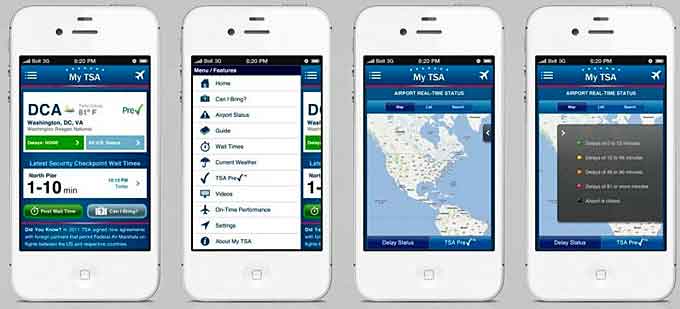
Save time and money with our helpful tips for preparing for security, including a searchable database of items that can and can’t go in checked or carry-on bags.
With “MyTSA”, you can also:
- Check the delay information and current weather conditions at your favorite airports nationwide.
- Quickly search which items you can bring with you through the checkpoint onto the airplane.
- Consult the TSA Guide on how to prepare for and get through the security checkpoint quickly.
- Discover which airports and airlines support TSA Pre✓®, and learn how to sign-up.
- Request live assistance from TSA through the AskTSA social media integration.
Travel Gear
Scuba Diving: Traveling with diving gear while on Spring Break? Read these tips on how to pack your scuba gear.
Batteries: You can’t go anywhere without some kind of battery these days. Learn about what types of batteries you can travel with.
Baggage Locks: Want to lock your checked baggage? Be sure to read about TSA recognized locks.
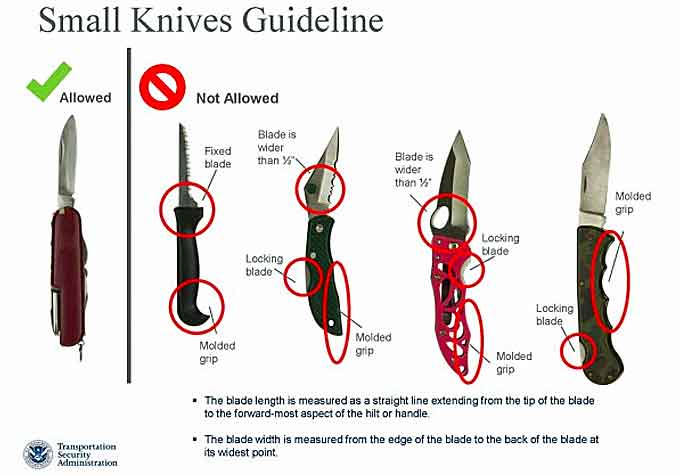
Blades: Anything with blades, points or spikes should be placed in your checked baggage. This includes knives of all sizes, as well as blender and food processor blades. Nail clippers and corkscrews are permitted, but models with blades attached are prohibited.
Camping, Backpacking, or Fishing: If you’re heading to the great outdoors, be sure to check out this post about traveling with camping and fishing gear.
Shaving Razors: In brief, all razors are permitted in checked bags. Disposable razors are permitted in carry-on bags, and safety razors with removable blades are not. Check out our blog post for pictures of razor examples.
Sporting Goods: Golf clubs, baseball bats, cricket bats, bows and arrows, hockey sticks, scuba knives, spear guns, etc. are all prohibited from being carried onto the plane. However, you can place them in your checked baggage. Read our blog post for more info on sporting goods.
Packing Your Carry-On Bags
(You are allowed to bring a quart-sized bag of liquids, aerosols, gels, creams and pastes through the checkpoint. These are limited to 3.4 ounces (100 milliliters) or less per item. This is also known as the 3-1-1 liquids rule. Courtesy of the TSA and YouTube)
Liquids, Gels & Aerosols: If you’re checking a bag, make your life simple by packing liquids in your checked baggage.
That way, you don’t have to worry about the liquids rules.
If you’d like to pack liquids in your carry-on bag, you’re allowed to take as many 3.4 ounce or smaller sized containers that will fit in one sealed, clear, quart-sized zip-top bag – and one bag per person.

3.4 ounces (100 ml) or smaller sized containers that fit in a 1 quart-sized resealable bag may go in carry-on and through checkpoint security. Containers that are larger than 3.4 ounces (100 ml) regardless of amount inside must be in checked baggage.
Make sure you take the zip-top bag out of your carry-on prior to sending it through the X-ray.
- Deodorant: Flying with deodorant isn’t a sticky situation. Stick deodorant is not limited to 3.4 oz or less, but gel or spray deodorant is. Read more about deodorant in our blog.
- Makeup: Any liquid makeup such as eyeliner, nail polish, liquid foundation, etc., should be placed in the baggie. That goes for perfume as well. Read our blog post on traveling with beauty products.
- Powders: Are generally okay, however, know that TSA officers may provide instruction to remove powders and may result in secondary screening.
- Sunscreen: Sunscreen and tanning lotions must adhere to the TSA liquid policy.
- Foods: Cakes, pies, bread, donuts, fruits, vegetables, etc. are all allowed.
- Beverages: Wine and all of your favorite beverages are permitted in your checked baggage. You can also bring beverages packaged in 3.4 oz or less bottles in your carry-on in the liquids bag. Just because you can pack alcohol doesn’t mean that you can drink them on the flight. FAA regulations state that “No person may drink any alcoholic beverage aboard an aircraft unless the certificate holder operating the aircraft has served that beverage.”
Duty Free Liquids: You may carry more than 3.4 oz or 100 ml of duty free liquids in secure, tamper–evident bags in your carry-on bag if:
- The duty free liquids were purchased internationally and you are traveling to the United States with a connecting flight.
- The liquids are packed in a transparent, secure, tamper-evident bag by the retailer and do not show signs of tampering when presented to TSA for screening.
- The original receipt for the liquids is present and the purchase was made within 48 hours.
(Are you traveling with medication and have questions about the airport checkpoint screening process? Learn what to expect on your next flight. Courtesy of the TSA and YouTube)
Medication: One of the more popular questions we get from travelers is: “Can I travel with my medication?” The answer is yes. Read about and watch how to best travel with your medication.
Prohibited Items: Some travelers pack the craziest items. So know what’s in your bag.
Make sure your items are allowed by using the “What Can I Bring?” tool to enter the item you want to pack. It will tell you whether you can pack it in your carry-on or checked bag.
(TSA officers often discover unusual items in carry-on and checked bags. We’d like to share just a few of the more offbeat items with you in our Top Ten Most Unusual Finds of 2017! Courtesy of the TSA and YouTube)
If you can’t find the answer, reach out to our @AskTSA team via Twitter or Facebook Messenger and they’ll get back to you right away with an answer.
You can even send them a photograph of the item in question. If you’re grabbing a bag, suitcase, briefcase, jacket or other item you haven’t used in a while, be sure to give it the once-over so you don’t accidentally take something prohibited to the checkpoint.
Many people who have brought guns, ammunition, knives and other prohibited items say that they did so unknowingly.
At the Security Checkpoint
Arrive Prepared: You should take the time to arrive early to the airport to allow enough time to park, get your boarding pass, check your baggage and go through the security checkpoint.
We recommend arriving at the airport up to two hours before your domestic flight if you are not yet enrolled in TSA Pre✓®.
Also, we recommend noting when your airline gate boards and closes by referring to your boarding pass.
(The TSA Pre✓® application program allows U.S. citizens and lawful permanent residents to directly apply for TSA Pre✓® expedited screening. Be part of an expedited security screening program that helps take the stress out of travel. No need to remove shoes, laptops, liquids, belts and light jackets. Courtesy of the TSA and YouTube)
TSA Pre✓®: What is TSA Pre✓®? In a nutshell, it allows eligible travelers to receive expedited screening. In layman’s terms, it means you get through security really fast.
The average wait time in TSA Pre✓® lanes is under 5 minutes! Even if a TSA Pre✓® line looks longer, they move much faster than a standard lane with more convenience.
For TSA Pre✓® travelers, there is no need to remove shoes, laptops, liquids, belts and light jackets. If you haven’t already, apply now!
TSA Pre✓® travelers (including those enrolled in Global Entry, NEXUS and SENTRI), have access to faster TSA Pre✓® lanes at 200 airports when flying with 47 participating airlines.
 To find the program that best suits your travel needs, use the DHS trusted traveler comparison tool.
To find the program that best suits your travel needs, use the DHS trusted traveler comparison tool.
You can now view TSA Pre✓® lane schedules. Travelers can enter their airport, day of week and time of day they’re traveling, and the tool will return the availability of TSA Pre✓® lanes.
When no lane is available, travelers can show their boarding passes with the TSA Pre✓® indicator to receive expedited screening in a standard lane.
TSA Pre✓® Not Reflected on Boarding Pass: If you’re looking at your boarding pass and you don’t see the TSA Pre✓® indicator even though you’re an approved trusted traveler, we’re here to help!
Get live assistance by tweeting @AskTSA or via Facebook Messenger. Our AskTSA team can help resolve any issues. If you prefer to call, you can reach out to our contact center.
(U.S. Armed Forces, including those serving in the Reserves and National Guard can benefit from TSA Pre✓® expedited screening which allows you to keep on your shoes, jacket, belt and leave your laptop and liquids in your carry-on bag. Courtesy of the TSA and YouTube)
Military Travel: TSA offers screening benefits for members of the U.S. Armed Forces.
Active duty service members and Cadets and midshipmen of the U.S. Military Academy, Naval Academy, Coast Guard Academy and Air Force Academy are also eligible to receive TSA Pre✓® screening benefits.
Supply your DoD ID number as your Known Traveler Number on each reservation. Learn about TSA Pre✓®.
(Traveling with infants requires a variety of essentials including food, carriers, diapers and other care items. Here is what you need to know about the safe and secure screening process for these necessities. Courtesy of the TSA and YouTube)
Traveling with Children: Did you know that children 12 and under can keep their shoes on? Read about the screening process and how to best pack for your child.
Children 12 and under may also travel through the TSA Pre✓® lane if one or both of their parents have it!
REAL ID: TSA will continue to accept driver’s licenses from all compliant states or noncompliant states with an extension.
Traveling with a Pet: Contact your airline first to ask about requirements, fees or restrictions they might have.
Read about going through security screening with your pet.
How can we help you?
(Courtesy of the TSA and YouTube)
Ask TSA: Have questions? Reach out to our AskTSA team via Twitter at @AskTSA or via Facebook Messenger.
We have a team standing by 9 a.m. to 7 p.m. ET daily. If you prefer to call or submit an online form, you can reach out to our contact center weekdays from 8 a.m. to 11 p.m. ET and weekends/holidays from 9 a.m. to 8 p.m. ET.
Lost or Forgotten IDs: We’ve gotten many calls from people who’ve had a wallet stolen or lost on a trip and have no ID for their return trip.
Don’t worry, if this happens to you, you’ll still be permitted to fly as long as you help us verify you are who you say you are by answering a few questions.
It’s wise to get to the airport a little earlier just to be safe.
Lose Something? Contact the airport lost and found. It’s a good idea to tape your business card or contact info to your valuable electronics or other items.
Not only does this help us contact you if you lose your items, it prevents travelers from grabbing the wrong item by mistake.
You can also contact our AskTSA team via Twitter at @AskTSA or via Facebook Messenger.
(Are you traveling with cancer and have questions about the airport checkpoint screening process? Learn what to expect on your next flight. Courtesy of the TSA and YouTube)
(Are you or someone you know on the Autism Spectrum and preparing for a flight? Watch and learn on what to expect during airport security screening if you or someone you know have communication, social interaction and/or have sensory sensitivities. Courtesy of the TSA and YouTube)
(Are you a part of the transgender community and have questions about the airport checkpoint screening process? Learn what to expect on your next flight. Courtesy of the TSA and YouTube)
(Wounded Warriors can get screening assistance by using the TSA cares helpline. TSA Cares is a helpline that provides travelers with disabilities, medical conditions and other special circumstances additional assistance during the security screening process. Please call 72 hours prior to traveling with questions about screening policies, procedures and what to expect at the security checkpoint. Courtesy of the TSA and YouTube)
As a reminder, public awareness is key for supporting TSA’s security efforts. Travelers are encouraged to report suspicious activities, and remember If You See Something, Say Something™.
(Homeland security begins with hometown security. This PSA seeks to empower everyday citizens to protect their neighbors and the communities they call home by recognizing and reporting suspicious activity. Across the country, we all play a role in keeping each other safe. Courtesy of U.S. Department of Homeland Security and YouTube)
For individuals traveling abroad, please check the U.S. Customs and Border Protection Know Before You Go page to learn about required documentation.
Safe Travels!
Original post https://www.tsa.gov/blog/2018/03/14/tsas-2018-spring-break-travel-tips












